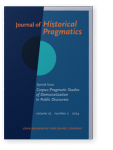A corpus-pragmatic analysis of linguistic democratisation in the British Hansard
Comparing the two Houses
In this article, we investigate changes in British parliamentary discourse by using the Hansard Corpus
(1803–2005). Our first goal is to determine whether parliamentary speeches have become colloquialised by studying frequency
changes of select features associated with informal spoken language. Second, by analysing data from the House of Commons and the
House of Lords separately, we show that the texts from the two Houses should be considered distinct sub-registers, each with their
own conventions and development paths. Finally, we analyse a pattern that seems particularly relevant to parliamentary debates:
one where speakers imply disagreement by referring to their peers in the third person, thus circumventing a parliamentary
regulation whereby speakers are prohibited from addressing one another directly. Our findings support the idea of an ongoing
colloquialisation/democratisation trend affecting parliamentary discourse while also suggesting that this process is not entirely
transparent in the written record because of editorial interference.
Article outline
- 1.Introduction
- 2.Democratisation, colloquialisation, and related processes
- 3.Features in focus
- 3.1Private verbs
- 3.2Progressives
- 3.3
That-deletion
- 4.Material and methods
- 4.1Hansard corpus
- 4.2Data retrieval and analysis
- 5.Results
- 5.1Private verbs
- 5.2Progressive verb phrases
- 5.3Complement clauses and that-deletion
- 5.4The pragmatics of coreferential complement clauses
- 6.Discussion
- Notes
-
References
-
Corpora, primary sources and text collections
